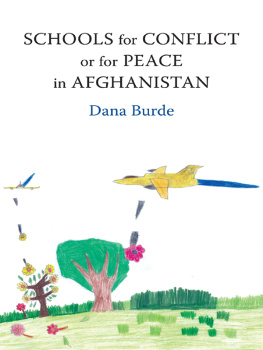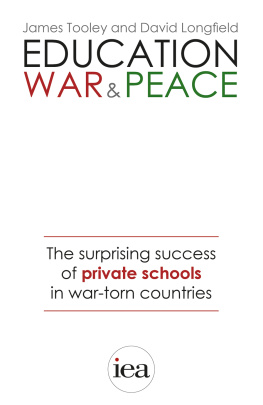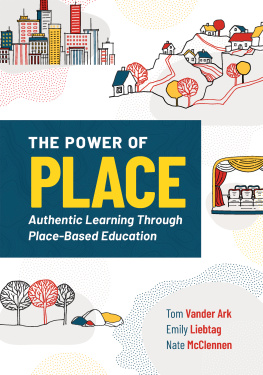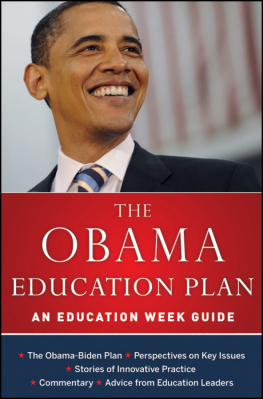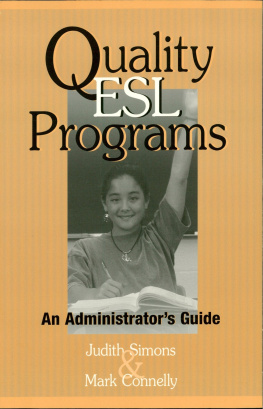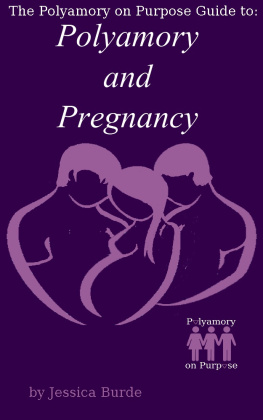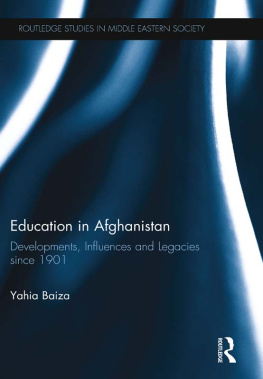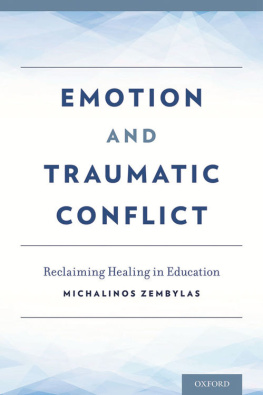Schools for Conflict or for Peace in Afghanistan
Schools for Conflict or for Peace in Afghanistan
DANA BURDE
Columbia University Press New York
Columbia University Press
Publishers Since 1893
New York Chichester, West Sussex
cup.columbia.edu
Copyright 2014 Columbia University Press
All rights reserved
E-ISBN 978-0-231-53751-3
Library of Congress Cataloging-in-Publication Data
Burde, Dana.
Schools for conflict or for peace in Afghanistan / Dana Burde.
pages cm
Includes bibliographical references and index.
ISBN 978-0-231-16928-8 (cloth : alk. paper) ISBN 978-0-231-53751-3 (ebook) 1. EducationAfghanistan. 2. SchoolsAfghanistan. 3. Education and stateAfghanistan. 4. Nation-buildingAfghanistan. 5. Economic assistance, AmericanAfghanistan. 6. Humanitarian assistance, AmericanAfghanistan. I. Title.
LA1081.B87 2015
370.9581dc23
2014010612
A Columbia University Press E-book.
CUP would be pleased to hear about your reading experience with this e-book at .
COVER ART: Flower and Bomb by Ehsan Hossaini, age 8 (Kabul, Afghanistan). This drawing was submitted to the United Nations Art for Peace Contest in 2012, sponsored by the United Nations Office for Disarmament Affairs and the Harmony for Peace Foundation (see www.unartforpeace.org).
References to websites (URLs) were accurate at the time of writing. Neither the author nor Columbia University Press is responsible for URLs that may have expired or changed since the manuscript was prepared.
To my husband, Jehanzaib Khan, and my parents, Ed and Emily Burde
Contents
I COULD NOT HAVE COMPLETED THIS BOOK without enormous support from many people and institutions. I began the work when I was a postdoctoral research scholar at the Saltzman Institute of War and Peace Studies (SIWPS) at Columbia University. Kathy Neckerman and the Institute for Social and Economic Research and Policy (ISERP) at Columbia supported my first trip to Afghanistan. My wonderful colleagues at SIWPSTanisha Fazal, Page Fortna, Bob Jervis, Pablo Pinto, Tonya Putnam, and Jack Snydergave me terrific feedback and provided a stimulating and supportive atmosphere that allowed me to thrive. Devon Curtis and Kelly Greenhillco-postdocsalso enriched my time at Columbia and helped me design successful plans for my projects. Thanks also to Neil Boothby and Gita Steiner-Khamsi for their encouragement and support early on in this work.
The Spencer Foundation, the United States Institute of Peace, and the Weikart Family Foundation funded my first pilot study in the Panjshir Valley in Afghanistan in 2006, without which the larger study in Ghor Province would not have been possible. Phyllis and Kathy Weikart, Cindy Embry, and Jenny Danko, all of the Weikart Family Foundation, gave tremendous support and a crucial vote of confidence; David Weikarts work and memory have been an inspiration throughout. The Spencer Foundation and the National Science Foundation (NSF) funded the large-scale randomized controlled trial in Afghanistan, and I owe an enormous debt of gratitude to Susan Dauber of the Spencer Foundation for her willingness to take a risk on a project that surely seemed crazy at the time. Thanks also to Brian Humes at NSF, who saw the merit in collecting data in difficult circumstances. Kathy Neckerman at ISERP went above and beyond in providing insights into the secrets of proposal writing.
Since moving to New York University, I have been fortunate enough to work with another truly lovely group of colleagues, without whose support I would not have been able to complete this book. At the Steinhardt School I owe tremendous thanks to Dean Mary Brabeck, Senior Vice Provost for Global Faculty Development Ron Robin, Vice Dean Beth Weitzman, and my department chair, Jon Zimmerman, all of whom have taken a personal interest in my adventures and offered generous support both institutionally and personally. They supported my research leave in Pakistan in 201213 (Goddard Fellowship, New York University Challenge Research Fund, CARE Fellowship, and Fulbright Research Scholar Fellowship), which provided both essential proximity to the data and time to complete the manuscript. I am grateful also to my departmental colleagues, who have been willing to make do in my absence and been patient as I phone in to meetings and advise students from afar. I am particularly indebted to Phil Hosay, Cynthia Miller-Idriss, and Kiki Pop-Eleches, who were also critical in making my research leave possible.
Of course this work could not have been completed without the help of a great number of colleagues in Afghanistan or the tremendous work of my coauthor on the large-scale, mixed-methods, randomized controlled trial, economist Leigh Linden (University of Texas at Austin). I appreciate the help and patience of the Catholic Relief Services (CRS) team in Afghanistan that collaborated with us: Zia Ahmad Ahmadi, Sara Alexander, Epifania Amoo-Adare, Feroz Arian, Keith Aulick, Sara Bowers, Christine Carneal, Michaela Egger, Eric Eversmann, Kevin Hartigan, Paul Hicks, Matthew McGarry, Dominique Morel, Nafi Olomi, Huma Safi, and Aude Saldana. Anita Anastacio and Helen Stannard, from the Partnership for Advancing Community Education in Afghanistan, and Lisa Laumann, from Save the Children, provided additional support. Thanks to Fotini Christia for insights into her study of the National Solidarity Program. Nathan Falkner provided valuable research assistance. Matthew Hoover offered exceptional support as both a research assistant and project manager, and thanks to Saeed Mahmoodi for his unparalleled work as our survey manager.
CRS and CARE provided institutional support in the last phase of this study, cohosting me in Kabul in fall 2012. For that trip I owe thanks to Doc Coster, Denzyl Kennedy, and Jennifer Rowell at CARE; Bill Schmitt and Michelle Neukirchen at CRS. And thanks to Nancy Dupree for the tour of the archives at the remarkable new Afghanistan Center at Kabul University.
Many friends and colleagues offered support and insights on the other side of the border, in Pakistan. I owe a tremendous debt to Helen Kirby for hosting my first trip there in 2005 and helping me understand the refugee villages in Balochistan. Amin Aminullah was also instrumental during that visit. At CRS in Pakistan, I thank Jack Byrne, Carolyn Fanelli, Michelle Markey, Joanna Olsen, and Andy Schaefer for their key support at critical moments.
Very dear friends provided transnational support. Without their collective insights and good humor, writing this book would not have been possible. They include Susan Allee, Maureen Agostini, Anita Anastacio, Allison Anderson, Ashley Barr, Charlotte Blomhammar, Sara Bowers Posada, Elise Cappella, Dalton Conley, Staffon Darnolf, Wendy Fisher, Simona Gallotta, Toral Gajarawala, Marcela Goglio, Debby Greenebaum, Susie Greenebaum, Jennifer Hill, Katre Jervis, Carolyn Kissane, Karen Krahulick, Jamie Lew, Mimi Lind, Cathryn Magno, Veronica Mijelshon, Mike Meyer, Yolande Miller-Grandvaux, Erin Murphy-Graham, Kim Perlow, Cybele Raver, Pilar Robledo, Sarah Simons, Tammy Smith, Sherrill Stroschein, Pietro Tilli, Florencia Torche, Kathryn Vittum, Niobe Way, and Davina Weinstein.
A number of friends and colleagues offered invaluable feedback at several phases of the writing. I am deeply grateful to Kevin Hartigan, Lori Heninger, Jennifer Hill, Bob Jervis, Elisabeth King, Jennie Matthew, Joel Middleton, Chris Pagen, Jennifer Rowell, Nerina Rustomji, Melissa Schwartzberg, Jack Snyder, Noah Sobe, Chris Steel, Niobe Way, and Jon Zimmerman. Thanks also to Paul Fishstein and Jason Lyall for their astute comments on . I also owe immense thanks to my doctoral students for their research assistance over the years: Amy Kapit, Rachel Wahl, and Ozen Guven. And special thanks to Max Margulies for his phenomenal job of editing and helping me stay on track. Of course any errors are my own.

